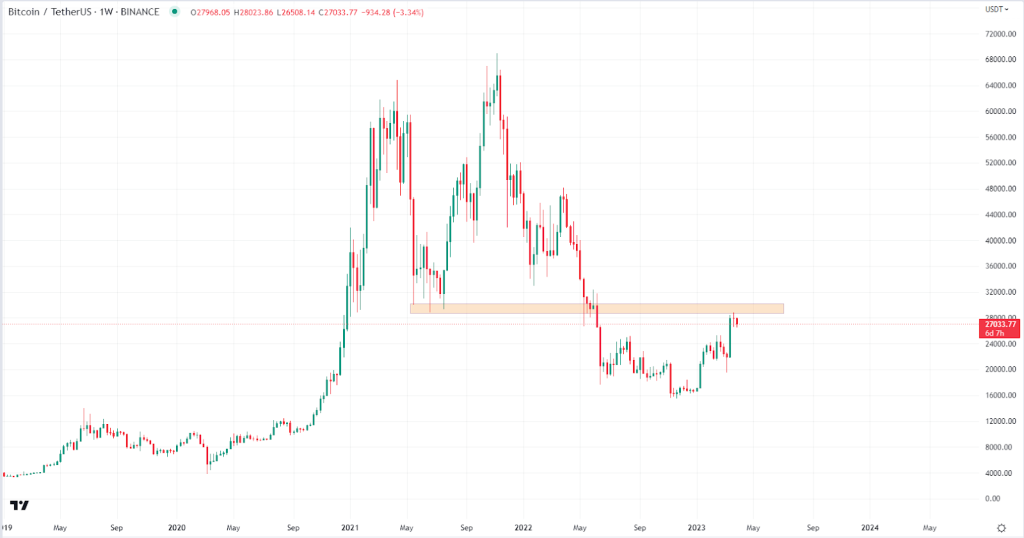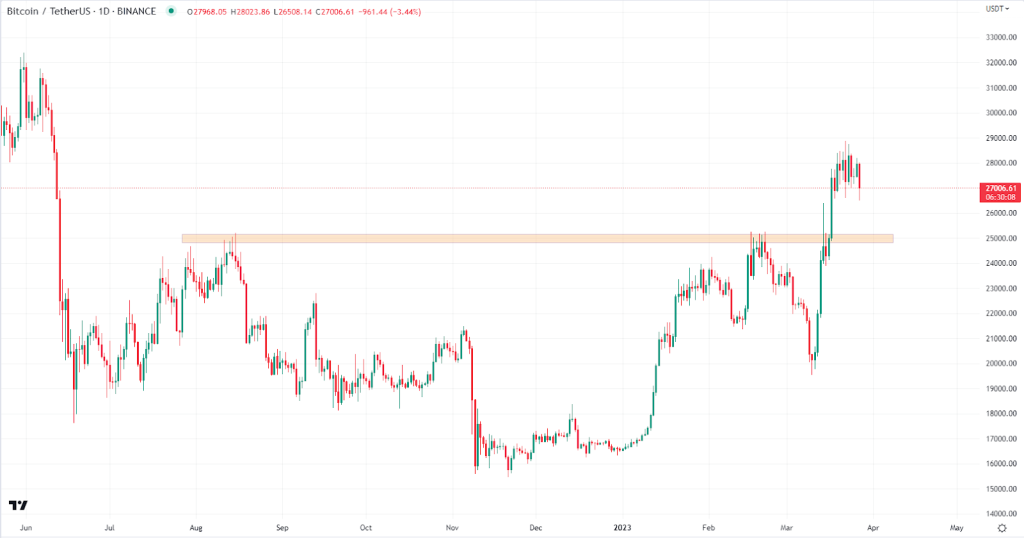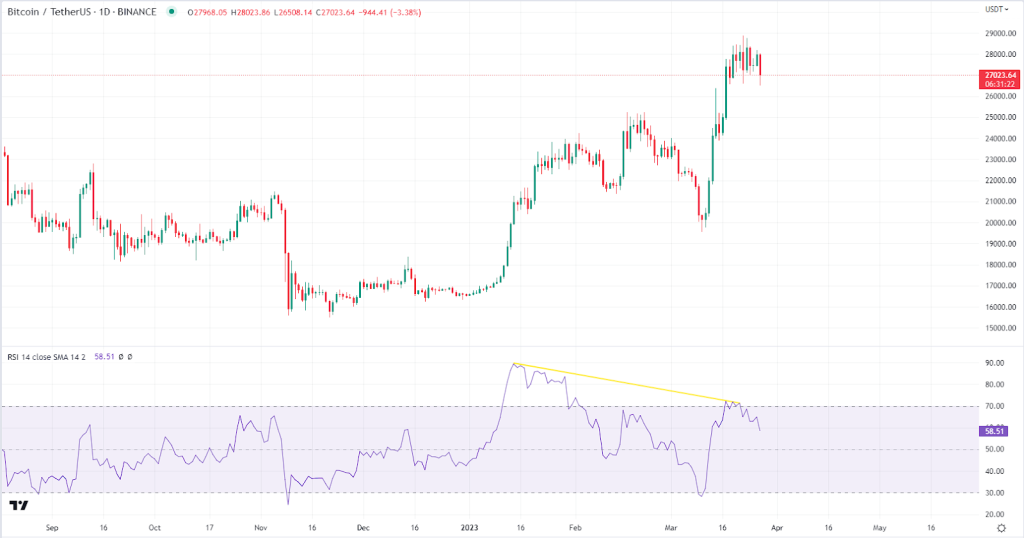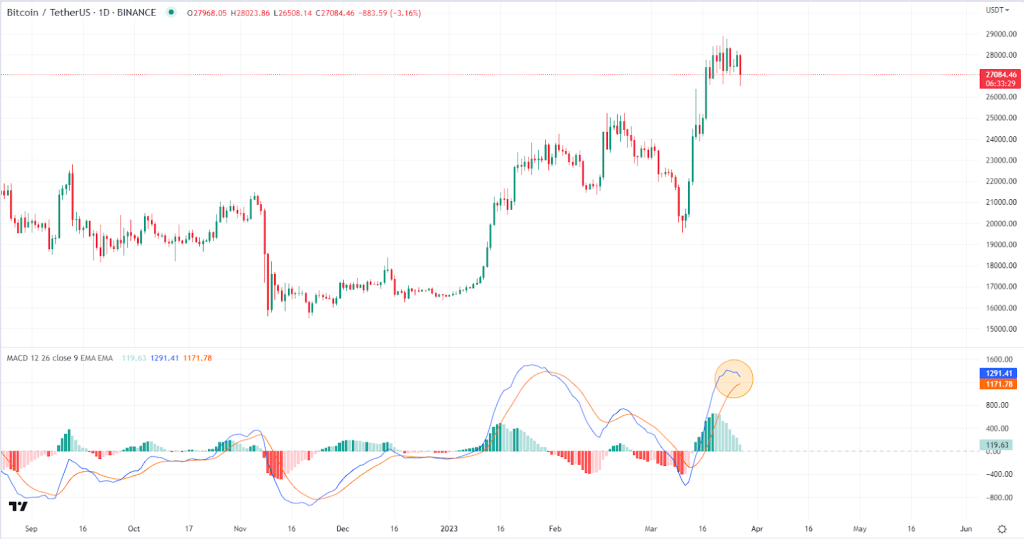For a week now, the king of all cryptocurrencies, Bitcoin, has been holding at the level of $29,000 and judging by the mood of the market, is in no hurry to break through it. The latest price jump was driven by a slight bank fall and an increase in the US Fed’s interest rate. Thus, Bitcoin was able to reach the level of $28,500, where it stopped its growth, moving into a sideways movement in the range starting from $26,600.
The coin has not seen such a price since June 2022, when another fall sent it into a protracted knockout. And if you scroll the chart up to this date, you can see that even then the price was in a long flat, when the buyers struggled to contain the fall and tried to regain control. But, supply exceeded demand and another collapse occurred.
And it’s all about the levels. Support often becomes a mirror level and turns into resistance, which can be observed at the moment.
From May to June 2022, the level around $28,000 acted as a strong support, which did not allow the price to go lower. Now, if you extend this level, you can see that it now acts as resistance, and it does not allow Bitcoin to rise in price. We can say that this is a key level, if it is broken, the road to $36,000 will open, where the next mirror resistance will already be.
Another important point is that this level is a continuation of the support indicated back in 2021, when there was the first major collapse after a stunning growth.

In the same way, based on the principle of mirror levels, we can conclude that the nearest strong support is in the region of $25,000. It was this level that acted as resistance since August 2022 and was broken only on March 17, 2023, and then for a second time. In this case, we can assume that the price will fall towards it and after the test, it will be easier for buyers to gain volumes that they can use to break through the resistance.

And fears about the decline are not in vain. The first bell came on March 27, when the CFTC filed a lawsuit against Binance and its CEO Changpeng Zhao. Since the news was released, Bitcoin has fallen in price from $28,000 to $27,000 in less than 4 hours. The news can always be tracked in the economic calendar.
In addition, bearish divergence is noticeable on the RSI indicator. It is clearly visible on the daily chart, which is a sell signal.

On the 4-hour chart, if you look closely at the current sideways movement, you can also see a bearish divergence, which can be regarded as a confirming sell signal.

Also, there is a noticeable downward trend in trading volumes. The market is slowing down, or, as traders like to say, preparing for a bounce. This can be correlated with the fact that, according to analysts, there are now about 13 million BTC in circulation using Immediate Alpha, and about 6 million has been irretrievably lost.

Also, on the daily chart, the MACD indicator is approaching a sell signal. And it is worth remembering that the higher the timeframe, the more accurate the signal.

Analyzing directly horizontal volumes using the Volume Profile, the price around $25,000 really acts as its accumulation. This means that the big players have something to rely on when defending their positions.

Based on all the conclusions made, we can tell that the probable price movement will occur exactly down to the level of $25,000, where the next struggle between buyers and sellers will begin. It is important to remember that it is unprofitable for large investors to allow another global collapse. Whales will hold on with their last strength so that the rate continues to grow, albeit with minor corrections.
With a successful outcome, we will be able to see a test of this zone of buyers’ interest and a directed upward movement to break through the resistance of $29,000 and consolidate in the $30,000 area. After that, we can talk about further movements and development.
It’s worth adding that a price retracement of $30,000 could be a historic moment when the next resistances will have minimal impact on the price and the ATH break will not be far behind.

